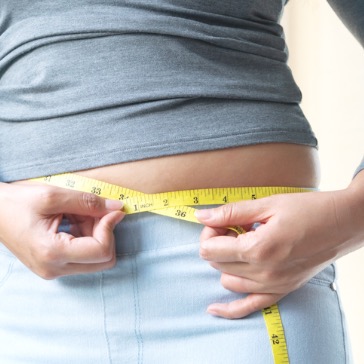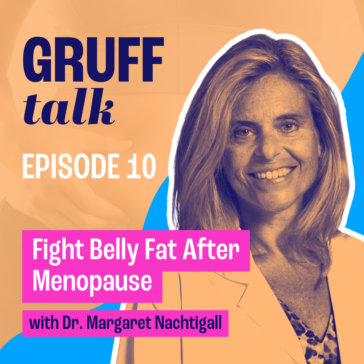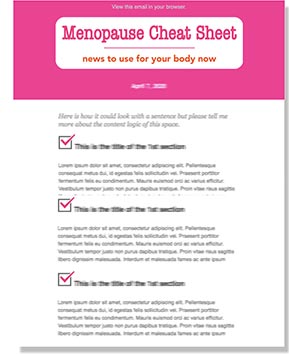LISTEN TO FULL PODCAST HERE
In our monthly ‘Menopause Cheat Sheet’ episode of GRUFFtalk, Dr. Margaret Nachtigall is addressing a listener’s question about gaining weight after menopause, particularly in the abdominal area. Dr. Nachtigall simplifies what causes these physical changes, why it’s actually dangerous, and what you can do about it . . . starting today!
Dr. Margaret Nachtigall is a board-certified Reproductive Endocrinologist at NYU Langone Health. She is also the Medical Director of Menopause Cheat Sheet, a free newsletter we publish together to help women navigate life before, during, and after menopause.

Summary of the Conversation
What does insulin have to do with menopause?
During menopause, you may already know that estrogen levels decline, but do you understand how low estrogen levels impact insulin? Dr. Nachtigall explains how decreasing estrogen impacts the estrogen/testosterone ratio which contributes to a physiological train wreck that increases insulin levels causing insulin resistance. Understanding how insulin levels increase in relation to menopause explains why abdominal fat increases and becomes very difficult to deal with.
Other factors contributing to belly fat after menopause
Abdominal fat is not caused from a single hormonal event like menopause. It’s so important that we understand that menopause is a complicated physiological process that sets off a chain of events leading to belly fat, and that there are several other factors at play contributing to this challenge, as well.
Dr. Nachtigall shares how simple overlooked lifestyle habits we’ve adopted over the years, such as sleep and chronic stress, have a major role to play in belly fat before, during, and after menopause. She stresses the importance of exercise, active lifestyle choices, and healthy diets.
LISTEN TO THE CONVERSATION HERE
3 Healthy Tips and Reminders to Fight Belly Fat:
- Add strength-training to your fitness program and up your intake of protein in your diet
- Get enough sleep to keep weight better controlled
- Stress is a major factor you’ll want to minimize
In this episode, Dr. Margaret Nachtigall and I also discuss a few recent studies that look at the potential for frailty through grip strength and a balance test, and the risks associated with low levels of vitamin D. As we age, bone density, muscle loss, and loss of balance are all scary things to deal with, but it is NEVER too late to start living a healthy active lifestyle. Give yourself grace, do what you can in the beginning and build from there. Remember that maintaining muscle mass is crucial to the quality and longevity of your life.
“Use the time of menopause, or use the time of change of life as a way to really start being as healthy as possible, and to be your healthiest self.” -Dr. Margaret Nachtigall
Connect with Dr. Nachtigall
Sign up for our free monthly newsletter here:
Connect with Barbara:
Love Your Age: The Small-Step Solution to a Better, Longer, Happier Life
Barbara Hannah Grufferman website
Instagram @Barbara Hannah Grufferman
Facebook @BarbaraHannahGruffermanAuthor
































































